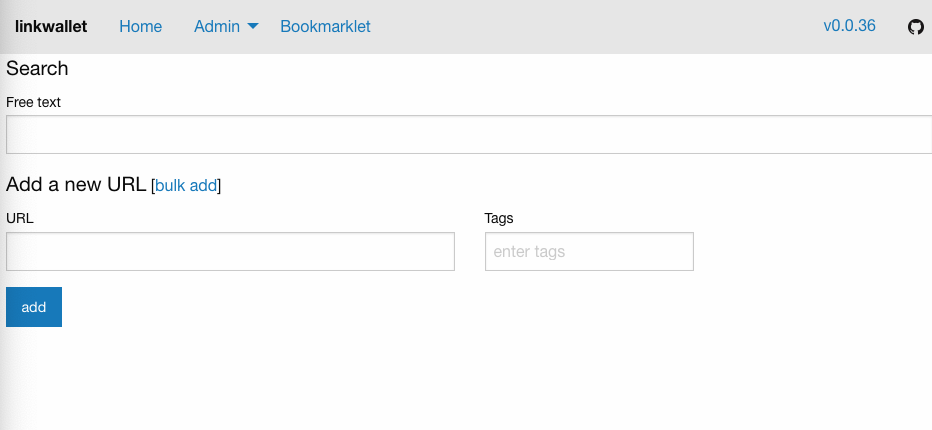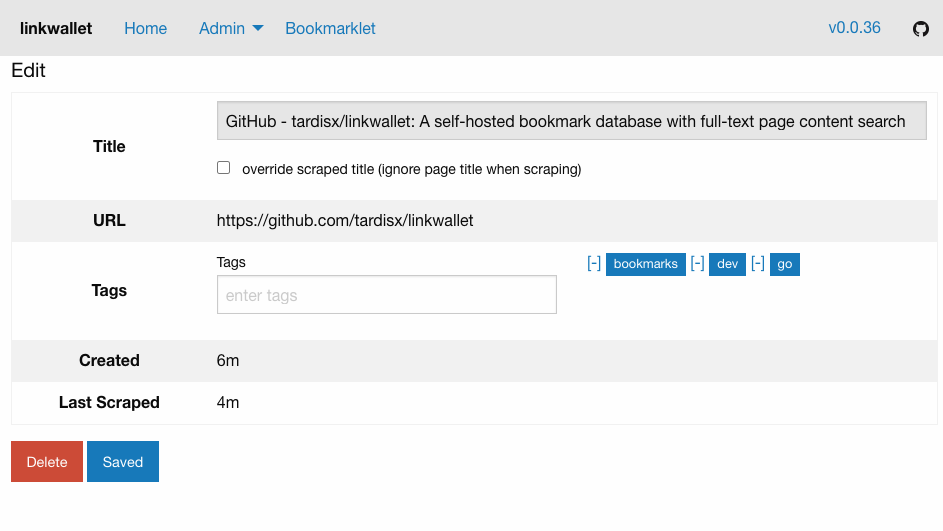LinkWallet - A Comprehensive Bookmarking Solution with Full-Text Search Capabilities - Build Your Personal Web Search Engine

LinkWallet is a groundbreaking, revolutionary product that takes the concept of a self-hosted bookmark database to a new level. It does not simply allow you to bookmark your favorite pages. Rather, it provides a comprehensive solution for managing, organizing, and accessing all of your most important online resources.
With its simple responsive interface, powerful features, and user-friendly design, LinkWallet makes it easier than ever to keep track of your favorite online content and access it quickly and efficiently, whenever you need it.
Key Features
Web Driven
Linkwallet is a web-driven app that operates on port 8109 for Docker or 8080 for binary. The port number can be adjusted through the PORT environment variable. If Linkwallet is on a separate machine or behind a reverse proxy, the 'BaseURL' parameter must be correctly set on the config page for bookmarklets to function.
Two-Click Bookmarking
With LinkWallet, you can add bookmarks in a jiffy using the bookmarklet. Just two clicks and your favorite page is bookmarked!
Full-Text Search
Forget the hassle of manually searching through your bookmarks. LinkWallet offers a full-text search feature that not only searches through the titles of your bookmarks but also their content.
Auto-Refreshing Content
With LinkWallet, your bookmarks stay updated. The app automatically re-scrapes and refreshes the page content periodically.
Interactivity and Speed
LinkWallet provides rip-roaring fast search results, offering you an interactive experience as you type in your keywords.
Embedded Database
LinkWallet is light on resources, with an embedded database that doesn't require a separate database. It's a compact tool with a ~21Mb binary, ~40Mb memory and ~24Mb database.
Bookmarklet
The app provides a simple bookmarklet tool. All you need to do is drag and drop it onto your browser's bookmark bar. With one click, you can add bookmarks.
Scrap any page
With just one click, you can easily scrape links, storing all the page content in your database. This enhances the search experience for your links, a feature not commonly found in other open-source bookmarking alternatives.
Data Export
Your data belongs to you, and LinkWallet respects that. You can easily export your bookmarks to a plain text file whenever you need.
Easy to Install
LinkWallet developers offer several ways to install the app, either by using Docker and Docker Compose, run from the binary or install it even as DEB or RPM package for your Linux distro.
The Cons

Although we appreciate the compact design and full-text search functionality of the app, which we use for our daily bookmark collection, it has a few limitations. The app only allows exporting links as a simple text file, and:
- It does not support browsing links by tags.
- To browse your links, you must navigate to a submenu under Admin.
- There is no tag browser for links.
- No option to add notes per link.
More features to expect
However, the app developer set some more advanced features in his next roadmap that will include:
- More options when managing links
- sorting
- More tag options
- bookmarklet with pre-filled tags
- search/filter on tags
Tech
The app is written in Golang.
Install LinkWallet
1. From The binary
The app provide a simple lightweight binary that runs using the Terminal. It is available for Windows, Linux, macOS (ARM/ Intel).
All is required is to download the single binary from the releases Github page, then run: ./linkwallet -db-path /some/path/xxxx.db where /some/path/xxxx.db is the location of your bookmarks database (will be created if it does not yet exist)
2. Install using Docker
To begin using LinkWallet, follow these easy steps:
- Make a copy of the
docker-compose.yml-sampleand place it in a suitable directory. - Rename this file to
docker-compose.ymland customize it to fit your specific requirements. Usually, the only alteration needed is changing the path to the/datamountpoint. - Execute the command
docker-compose up -dto launch the application.
In case you need to upgrade LinkWallet, simply:
- Run the command
docker-compose pullto fetch the latest updates. - Restart the application using
docker-compose up -d.
3. Install as a Linux Package
The app provide Linux packages for Fedora and Debian/ Ubuntu-based distros.
For package installation (deb/rpm), download the .deb or .rpm files from the release section. You can install these using apt, dpkg, or rpm.
The installation process automatically generates a systemd service which is enabled and initiated. The application operates under the user 'linkwallet' and the database is stored in the /var/lib/linkwallet directory.
4. Build from Source
In order to build it from the source, checkout the app source-code and make sure that you have Go installed in your system then run:
go build cmd/linkwallet/linkwallet.go
License
MIT License
Download the source-code and Binaries
You can download the source-code directly from the app repo, which also contain instructions about how to install and use.




